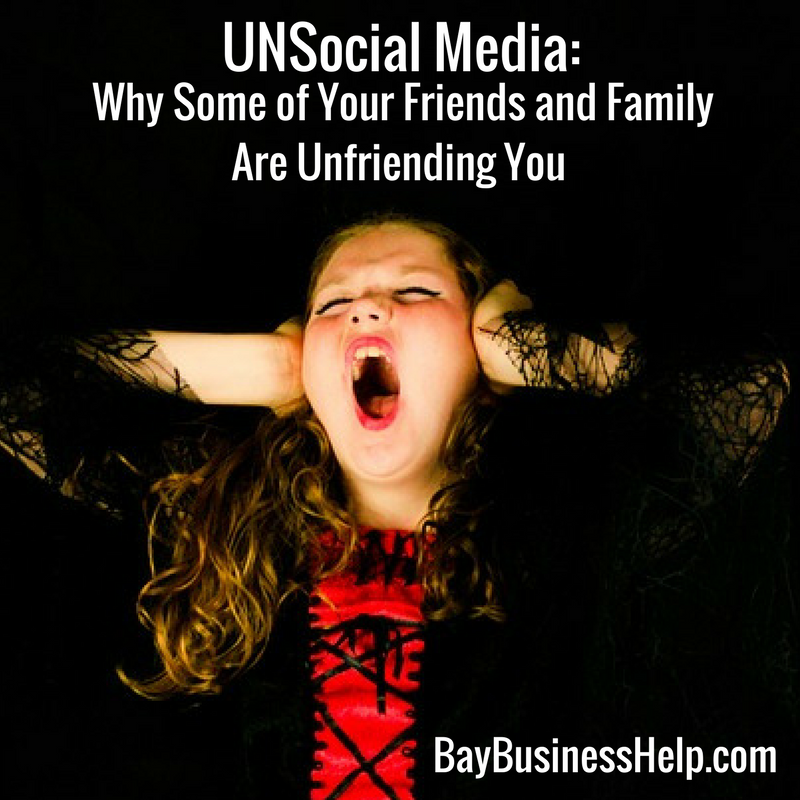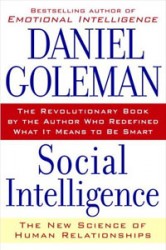UNSocial Media: Why Some of Your Friends and Family Are Unfriending You

“I love a dog. He does nothing for political reasons.”
– Will Rogers, American Humorist (1879 – 1935)
The Lesson from Two Old Men on a Bench
An elderly gentleman was sitting on a park bench, basking in the sun, when another elderly fellow sat down.
They looked at each other for a moment but did not speak.
Both men sat there, staring straight ahead.
After a while, one of them heaved a big, heartfelt sigh.
The other jumped up immediately and said, “If you’re going to talk politics, I’m leaving.”
Frenemies: The Strange Phenomenon Social Media Has Created
Social media has created a strange phenomenon where people randomly (and continually) state their opinions about politics.
In the past, people knew to not do this in a mixed group of people. Why?
Because they just knew it was asking for an argument or a rift in a friendship.
In fact, anyone who did such things was considered socially awkward and no one wanted to be around that person!
But in the social media world, we have forgotten this common sense social rule.
And what are the results of this lack of social intelligence? Friends and family members aren’t talking to each other anymore!
It’s not just that they are just “unfriending” each other.
Some no longer talk in the real world anymore either!
This is happening especially because of one social media platform in particular: Facebook.
Let me show you how this weird social phenomenon is playing out…
Facebook and the Rise of Social Unintelligence

Social media tools like Facebook have inadvertently created a false reality.
Think about it…
When we’re on Facebook we feel like whenever we want to “pop off” and give our opinions about politics, then we have every right to share our “personal opinions” on “our own wall.”
In fact, if anyone questions us about it, our response is, “It’s my wall! I can post anything I want to on it!!”
That’s not true!
In reality, our opinions are not just being posted on our walls. They are bombarding other people’s news feeds.
But wait a minute. It’s not just any or all of your friends on Facebook.
It’s people who we know and interact with enough on Facebook that Facebook’s algorithm considers us to be good friends with them – and assumes that we would want to see each other’s posts.
So, you see, in reality we’re NOT just posting our opinions on “our walls.”
We’re posting our opinions randomly on the news feeds of friends and family who we interact with frequently.
In the world of Facebook, that might not seem so weird, but in the real world it would be.
Let me show you what it would be like if we did this in the offline world.
If We Acted in the Real World Like We Do on Facebook

If we did the same thing we do on Facebook in the real world, then this is what it would be like…
It would be like randomly walking into a room full of our friends and family members, that we know from various walks of life, and just suddenly spouting off our opinions about politics.
Think about that for a second.
We have every right to do this, but would you really want to do that?
Would you do that if you knew you had people there – who you are related to and who you are good friends with – who are from all sides of the political spectrum?
And let me ask you this question…
If you DID do this, what would expect the normal response to be?
Would you expect everyone in the room to erupt into cheers, praise you for your intelligence, and confess their full agreement with everything you said!
No way! Not in a room full of friends from various walks of life!
You’d expect some people to agree with you, some people to think you’re an idiot, and some people to be ambivalent about your comments.
So we have every right to post any and all political opinions that we want to on Facebook.
But if we do, then we just need to realize this:
- We CANNOT then pretend to be surprised when some people get angry or tired of it.
- We CAN’T act shocked when they block us or even unfriend us. (Some might unfriend us because they’re not savy enough to know how to block or hide our posts).
- In fact, we MUST expect these type of responses.
Look, I am not saying that you can’t mention anything that has to do with politics on Facebook. You can!
I’m just saying that you need to remember that you need to apply the same offline rules to the WAY that you share those opinions on Facebook.
What If You’re Scared, Worried, Or Just Need to Vent?
Some people say, “But people are scared right now. They need a way to vent and get support!”
That’s totally understandable.
But here’s a suggestion for any of you who are scared, worried, or just need to vent…
Instead of ranting or yelling about it on Facebook, go hang out with a friend OFFLINE and talk about what you’re feeling.
Guess what will happen, if you do this?
- Just by doing that, you’ll automatically follow the normal social rules.
- And you’ll find that when you meet with a real person, face-to-face, you’ll gain the benefit of real social interaction with another human being.
- You’ll hear your own thoughts out loud and you’ll be able to hear someone else’s feedback to what you’re thinking and feeling.
Posting your rants on Facebook will never give you those benefits!
Besides missing out on those benefits, by continuing to choose NOT to meet with real people to discuss these things, then something very negative could gradually happen to all of us.
Over time, we might all be unintentionally contributing to our the loss of social skills in our society and to the increase in violent behavior.
In a book called Social Intelligence: The New Science of Human Relationships, Daniel Goleman said this…

“Others point to data showing that even as toddlers, 40 percent of American two-year-olds watch TV for at least three hours a day—hours they are not interacting with people who can help them learn to get along better. The more TV they watch, the more unruly they are by school age.”
If that happens to toddlers when they watch at least three hours of TV a day, then imagine what will happen to us grown-ups after spending hours and hours, for years and years, primarily interacting with people on Facebook about these important issues!
The Future of Facebook in an Unsocial Culture
“Self-absorption in all its forms kills empathy, let alone compassion. When we focus on ourselves, our world contracts as our problems and preoccupations loom large. But when we focus on others, our world expands. Our own problems drift to the periphery of the mind and so seem smaller, and we increase our capacity for connection – or compassionate action.”
― Daniel Goleman, Social Intelligence: The New Science of Human Relationships
Let me be clear.
I am NOT blaming Facebook for this current problem. It’s not their fault!
They just created the platform, but we are the ones who have created the socially acceptable ways to act on it.
But I do think that Facebook might need to figure out a way to help discourage this type of behavior.
Why? Because I have seen multiple friends decide to “take a break” from Facebook, because they’re tired of all the non-sense.
For that reason, I think that Facebook is going to have a hard time surviving as a popular tool, if they don’t figure out how to stop or lessen the political rants from either side.
A Dangerous Echo Chamber

If they don’t figure out how to discourage this behavior, then besides losing members, Facebook might morph into a dangerous “echo-chamber,” where all we hear is our own opinions echoed back at us – from those who have remained “Facebook friends,” because they agree with us.
What’s the big deal if that happens?
There’s a story I want to leave you with that will reveal the danger of this happening…
There is a Greek myth about a good-looking young man who made it his goal in life to find someone to love.
So he began a journey to find this person.
But his search didn’t turn out the way you’d expect. At first things seemed to be going well.
He met the beautiful nymph Echo and he fell in love with her.
But the best part, for him, was that she fell in love with him too.
In fact, she was so in awe of his good looks that she repeated everything he said.
At first, he didn’t mind it.
But after a while he couldn’t take it up anymore, so he ended up rejecting her and she faded away.
He didn’t give up on his quest for love though.
He kept looking for the perfect mate until one day he finally found the one he thought was the perfect person.
But there was a problem.
You see he fell in love with this person when he looked into the water and saw his own reflection.
He fell in love with his own reflection, not realizing it was just an image.
When he finally realized that it was his own reflection he was in such despair that he ended up taking his own life.
And then something surprising happened.
At that spot on the riverbank where he died, grew a flower – a flower that is now named after this young man: Narcissus.
